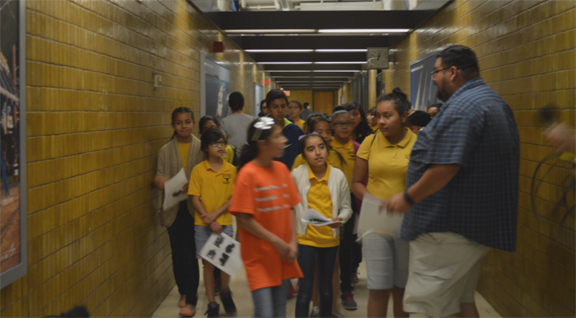Our lives are full of consumer products that can be traced back to NASA: invisible braces, infrared ear thermometers, memory foam and cordless drills. Now one El Paso-area organization has partnered with NASA to make this kind of technology transfer easier.
The Space Race challenge offers business planning, networking, mentorship and support to teams who are competing for up to $1.2 million in funding from venture capital investors. The Center for Advancing Innovation, a global public-private nonprofit is facilitating the program with El Paso-based Medical Center of the Americas Foundation.
“NASA has a very large number of researchers who are primarily dedicated to solving NASA’s problems, but once that technology has done its job for NASA, by and large, that’s the end of the road, said Jeff Fuchsberg, the director of intellectual property and innovation projects at the center.
His goal is to help the private sector make use of NASA’s research—and spur innovation, entrepreneurship and the aerospace industry in the Paso Del Norte region.
“Part of NASA’s original mission statement from way back when, was providing benefit to those of us on Planet Earth, too,” Fuchsberg said.
The space agency is also sponsoring research at the University of Texas at El Paso, where the Center for Space Exploration and Technology (cSETR) is training the next generation of engineers, astronauts and entrepreneurs.
Journalist Hugo Perez has this audio report on UT El Paso’s space program
Space tech education opportunities on the border
The commercial potential for technology developed for space travel is huge, said Jesus Trillo, a master’s student at cSETR. His focus in school has been developing better rocket engines, technology that’s already being used by commercial ventures like Blue Origin and Virgin Galactic to take paying customers into space.
“It’s going to be in the near future when we’ll have space tourism from these companies,” Trillo said.
Across the street from the high-rise building that currently houses the Medical Center of the Americas, El Paso High School student Richard Salas was walking across San Jacinto Plaza. He said he had always wanted to work with the space program.
“When I was a little kid, I told my mom, ‘I want to fix spaceships!’” he said. “She told me stay in school and get your diploma.”
MCA’s Space Race Challenge spurs space-tech business possibilities
Teams in the Medical Center of America Foundation’s Space Race Challenge were asked to pick one from a list of technologies NASA selected for having good potential for commercial use. And it’s offering to license them with no up-front costs. But the deal is only available for companies that have formed just for this purpose. And it’s only for companies based in the United States.
For example, NASA developed a paint-on coating to help protect rebar from corroding in the humid environment of the John F. Kennedy Space Center in Florida. Now it’s hoping someone can turn it into a product that can help protect apartment buildings, airport terminals or other facilities. Other technologies include systems for harnessing wind power and a robot excavator that could be used for mining operations in space.
The contest is made possible by Startup NASA, a government program devoted to making it easier for startups to take advantage of federally-funded technology. The biggest problems those companies face are raising money and navigating the complex legal process.
Mentorship for the startup teams comes from industry experts such as Aaron Prescott, who manages business development for Spaceport America near Las Cruces, New Mexico. Prescott has a degree in aerospace engineering and an MBA focused on space systems.
In May and June mentors will help each team develop a summary of the project and produce a 2-minute elevator speech video. In late summer they’ll expand that idea into a 10-page business plan and a longer live pitch.
In late August the business plans will be evaluated by a team of judges including Dot Swanson, the CFO of Johnson Space Center; Erika Wagner, the business development manager for Blue Origin; and Andrew Levy, a marketing expert at Twitter.
The finalists and winners will be announced in early September.
But even if none of the startups is successful in finding the next Dustbuster, the contest will have been successful, according to Fushberg. And the entrepreneurship training that the nearly 500 particpants will have received over four months will prepare them to persevere with perhaps another venture.
“Let’s say every company tanks, we’ve still exposed people to the notion that this is possible,” Fuchsberg said.
This multimedia story was produced for the 2016 Dow Jones News Fund Multimedia Training Academy by Gwyneth Doland, Myna German and Hugo Perez.

